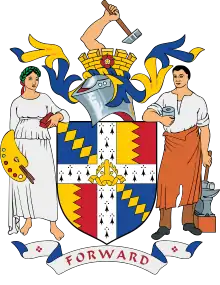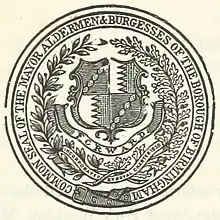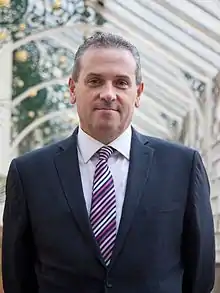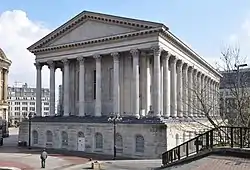Birmingham City Council
Birmingham City Council is the local government body responsible for the governance of the City of Birmingham in England, which has been a metropolitan district since 1974. It is the most populated local council area in the United Kingdom (excluding counties) with 101 elected councillors[4] representing over one million people, in 69 wards.[5] The council headquarters are at the Council House in the city centre. The council is responsible for running nearly all local services, with the exception of those run by joint boards. The provision of certain services has in recent years been devolved to several council constituencies,[6] which each have a constituency committee made up of councillors from that district. It is part of the West Midlands Combined Authority. On September 6 2023, the council declared effective bankruptcy,[7] and central government commissioners were later appointed to run the council under emergency measures.[8]
Birmingham City Council | |
|---|---|
 | |
Council logo post-2015 | |
| Type | |
| Type | |
| History | |
| Founded | 1 April 1974 |
| Preceded by |
|
| Leadership | |
Deputy Leader | Sharon Thompson, Labour |
Leader of the Opposition | Robert Alden, Conservative |
Chief Executive | Deborah Cadman since 14 June 2021 |
| Structure | |
| Seats | 101 councillors[3] |
 | |
Political groups |
|
Joint committees | West Midlands Combined Authority |
| Elections | |
| Plurality-at-large | |
Last election |
|
Next election |
|
| Motto | |
| Forward | |
| Meeting place | |
 | |
| Council House, Birmingham | |
| Website | |
| www | |
| Constitution | |
| www | |
History

The original Charter of Incorporation, dated 31 October 1838, was received in Birmingham on 1 November, then read in the Town Hall on 5 November with elections for the first Birmingham Town Council being held on 26 December. Sixteen aldermen and 48 councillors were elected and the Borough was divided into 13 wards. William Scholefield became the first Mayor and William Redfern was appointed as Town Clerk.
It was not until 14 January 1889 that another Charter conferred the rank of City on Birmingham. On 9 November 1891, the districts of Balsall Heath, Harborne, Saltley and Little Bromwich were absorbed into the City. The dignity of a Lord Mayor was conferred in 1896 and Sir James Smith Kt was appointed as the City's first Lord Mayor on 3 June 1896. The parish of Quinton became part of Birmingham on 9 November 1909 and two years later, under what was termed 'The Greater Birmingham Scheme', the Boroughs of Aston Manor, the Urban Districts of Handsworth and of Erdington, part of the Urban District of Kings Norton and Northfield and the Rural District of Yardley were all incorporated. Such was the expansion involved that the Council Chamber, originally designed to accommodate 80 members, had to be modified to seat the representatives of the new wards. Further additions occurred on 1 April 1928 (most of the Perry Barr Urban District) and 1 April 1931 (parts of the Parishes of Solihull, Castle Bromwich, Minworth and Sheldon). By 1972, there were 39 Wards each represented by an alderman and three councillors, a total of 156 members.
A major national re-organisation of local government was implemented in 1974 and saw the City of Birmingham being combined with the Borough of Sutton Coldfield to form the new Birmingham District Council consisting of 42 Wards each with 3 elected Councillors (in 1982 the number of Wards was reduced to 39). On 1 July 1986, the title was changed to Birmingham City Council. Part of Bromsgrove District known as Frankley and Kitwell Estates was added to the City on 1 April 1995. A review of the Ward boundaries on 10 June 2004 resulted in an increase from 39 Wards to 40 Wards.[9]
On 5 September 2023, Birmingham City Council issued a Section 114 notice, effectively a bankruptcy,[10] and is to stop all future spending with the exception of money for statutory services including the protection of vulnerable people. The leader of the Labour authority stated that the notice was a necessary step to get Birmingham back into a sound financial footing.[7]
Women
The first woman elected to the council, on 1 November 1911, was Ellen Pinsent.[11] She represented the Edgbaston Ward as a Liberal Unionist.[11] She had earlier been co-opted as a member of the council's Education Committee and served as Chairman of the Special School Sub-Committee.[11] She stood down from the council in October 1913 upon appointment as Commissioner for the Board of Control for Lunacy and Mental Deficiency.[11]
Pinsent's time on the council overlapped with that of Margaret Frances Pugh, who was elected on 22 November 1911 to serve in the North Erdington ward.[11] She resigned in November 1913.[11]
Birmingham's third woman councillor, Clara Martineau, was elected on 14 October 1913 in the Edgbaston ward, and served until 1932, when she died, aged 57.[11] Her father was former Mayor Sir Thomas Martineau, Lord Mayor Ernest Martineau was her brother, and Alderman Sir George Kenrick was her uncle.[11]
Mary E. Cottrell became the first female Labour councillor in February 1917, when she was elected unopposed to the Selly Oak ward.
The first female Lord Mayor, Marjorie Brown, held the post from 1973 to 1974. Theresa Stewart became the first female leader in October 1993,[12] until 1999; and Lin Homer the first chief executive, was in post from 2002 until 2005.
Political control



The council was run by a Labour administration between 1984 and 2004, with Sir Dick Knowles as Council Leader from 1984 to 1993, followed in turn by Theresa Stewart, and Sir Albert Bore. They lost overall control in 2003 but continued to run the council as a minority administration for the following year. At the election of 10 June 2004, the 121 seats were divided between the Labour, (53 councillors), Conservative (39) and Liberal Democrat (28) parties. The Conservative and Liberal Democrat groups then formed a governing coalition, moving Labour into opposition.
In 2005, Richard Mawrey QC (as an election commissioner) ruled invalid Birmingham City Council elections in two wards, Aston and Bordesley Green, held the year before, and required re-votes. He blamed most of the electoral fraud on absentee ballot manipulation, and implicated the returning officer and six Labour councillors. By-elections and defections in 2005 altered the distribution of seats within the council with Labour holding 46 seats, Conservatives holding 40, Liberal Democrats holding 30, the People's Justice Party holding 2 and independent councillors holding a further 2.
In 2006, the People's Justice Party disbanded, with their two councillors joining the Liberal Democrats, and Councillor Ann Holtom defected from Labour to the Liberal Democrats. In the 2006 local elections the British National Party initially gained a seat, but it soon transpired their candidate's election had been caused by a counting error and the result was subsequently overturned in favour of the previously third-placed Labour party candidate following an election petition.[13]
After the local elections on 1 May 2008, there remained no overall control, with the 120 seats divided between Conservative (49 councillors), Labour, (36), Liberal Democrat (32) and Respect (3).[14] After the 2010 elections the seats were divided between Conservative (45 councillors), Labour, (41), Liberal Democrat (31) and Respect (3).[14] The Conservatives' main local strongholds are in the Sutton Coldfield and Edgbaston constituencies. In the local elections on 5 May 2011, Labour won an extra 14 seats on the council but there continued to be no overall control, with the seats divided between Conservative (39 councillors), Labour, (55), Liberal Democrat (24) and Respect (3).[14]
Labour regained overall control in May 2012, gaining 20 seats for an overall majority on the council.[15] After the 2014 election, Labour were on 77 seats, having won 22, with the Conservatives on 31, winning 14 and the Lib Dems dropping to 12 seats, having won 5.[16][17] Labour gained a further 2 seats in 2015, increasing their total to 79, gaining a seat from each of the Tories and Liberal Democrats. They won 80 seats in 2016, gaining one each from the Conservatives and Lib Dems again from their 78 before the election. Boundary changes took place in 2018 and an all-out-election took place, with Labour winning 67 seats, the Conservatives 25, the Liberal Democrats 8 and the Green Party winning one seat. Following the 2022 council election, Labour continues to hold control of the council, winning 65 seats, with the Conservative Party dropping to 22 seats, the Lib Dems gained 4 seats to go back up to 12 and the Greens won a second seat on the council.
Cabinet
| Portfolio | Cabinet Member | Ward | Term | |
|---|---|---|---|---|
| Cabinet members of Birmingham City Council | ||||
| Leader of Birmingham City Council Leader of the Labour Group |
John Cotton | Glebe Farm & Tile Cross | May 2023 – present | |
| Deputy Leader of Birmingham City Council Deputy Leader of the Labour Group |
Sarah Thompson | North Edgbaston | May 2023 – present | |
| Cabinet Member for Finance | Brigid Jones | Bournbrook and Selly Park | May 2023 – present | |
| Cabinet Member for Housing & Homelessness | Jayne Francis | Harborne | May 2023 – present | |
| Cabinet Member for Environment | Majid Mahmood | Bromford and Hodge Hill | July 2022 – present | |
| Cabinet Member for Transport | Liz Clements | Bournville and Cotteridge | July 2022 – present | |
| Cabinet Member for Children, Young People & Families | Karen McCarthy | Bournbrook and Selly Park | July 2022 – present | |
| Cabinet Member for Health & Social Care | Mariam Khan | Alum Rock | July 2022 – present | |
| Cabinet Member for Digital, Culture, Heritage & Tourism | Saim Suleman | Hall Green North | May 2023 – present | |
| Cabinet Member for Social Justice, Community, Safety and Equalities | Nicky Brennan | Sparkhill | May 2023 – present | |
| Affiliation | Members[3] | ||
|---|---|---|---|
| Current | |||
| Labour | 65 | ||
| Conservative | 22 | ||
| Liberal Democrats | 12 | ||
| Green | 2 | ||
| Total number of seats | 101 | ||
| Actual majority | 29 | ||
Wards and councillors
Following the boundary review, the number of wards was increased from 40 to 69.[19][5]
Each ward is represented by either one or two councillors.
| Ward | Councillor | Party | Council Service | |
|---|---|---|---|---|
| Acocks Green | Roger Harmer | Liberal Democrats | 1995–2001, 2008–2012, 2014– | |
| Penny Wagg | Liberal Democrats | 2003–2011, 2022– | ||
| Allens Cross | Jack Deakin | Labour | 2022– | |
| Alum Rock | Mohammed Idrees | Labour | 2002– | |
| Mariam Khan | Labour | 2012– | ||
| Aston | Ayoub Khan | Liberal Democrats | 2022– | |
| Mumtaz Hussain | Liberal Democrats | 2022– | ||
| Balsall Heath West | Shehla Moledina | Labour | 2022– | |
| Bartley Green | Bruce Lines | Conservative | 2003– | |
| Kerry Brewer | Conservative | 2022– | ||
| Billesley | Phil Davies | Labour | 2012– | |
| Katherine Iroh | Labour | 2021– | ||
| Birchfield | Mahmood Hussain | Labour | 1996–2011, 2012– | |
| Bordesley and Highgate | Yvonne Mosquito | Labour | 1996– | |
| Bordesley Green | Raqeeb Aziz | Labour | 2022– | |
| Bournbrook and Selly Park | Brigid Jones | Labour | 2011– | |
| Karen McCarthy | Labour | 2012– | ||
| Bournville and Cotteridge | Liz Clements | Labour | 2017– | |
| Fred Grindrod | Labour | 2018– | ||
| Brandwood & King's Heath | David Sean Barker | Labour | 2022– | |
| Lisa Trickett | Labour | 2012– | ||
| Bromford and Hodge Hill | Diane Donaldson | Labour | 2016– | |
| Majidd Mahmoob | Labour | 2011– | ||
| Castle Vale | Ray Goodwin | Labour | 2022– | |
| Druids Heath and Monyhull | Julien Pritchard | Green | 2018– | |
| Edgbaston | Deirdre Alden | Conservative | 1999– | |
| Matt Bennett | Conservative | 2008–2012, 2015– | ||
| Erdington | Robert Alden | Conservative | 2006– | |
| Gareth Moore | Conservative | 2011– | ||
| Frankley Great Park | Simon Morrall | Conservative | 2018– | |
| Garretts Green | Saddak Miah | Labour | 2018– | |
| Glebe Farm and Tile Cross | Marj Bridle | Labour | 1986– | |
| John Cotton | Labour | 1999–2008, 2010– | ||
| Gravelly Hill | Mick Brown | Labour | 2012– | |
| Hall Green North | Akhlaq Ahmed | Labour Co-op | 2018– | |
| Saima Suleman | Labour | 2021– | ||
| Hall Green South | Timothy Huxtable | Conservative | 2002– | |
| Handsworth | Hendrina Quinnen | Labour | 2009– | |
| Handsworth Wood | Gurdial Singh Atwal | Labour | 2004– | |
| Narinder Kaur Kooner | Labour | 2006– | ||
| Harborne | Martin Brooks | Labour | 1982–1999, 2022– | |
| Jayne Francis | Labour | 2016– | ||
| Heartlands | Shafique Shah | Labour | 2005– | |
| Highter's Heath | Adam Higgs | Conservative | 2018– | |
| Holyhead | Rinkal Shergill | Labour | 2022– | |
| King's Norton North | Alex Aitken | Labour | 2018– | |
| King's Norton South | Rob Grant | Green | 2022– | |
| Kingstanding | Des Hughes | Labour | 2010–2014, 2015–2018, 2022– | |
| Rick Payne | Conservative | 2022– | ||
| Ladywood | Albert Bore | Labour | 1980– | |
| Kath Hartley | Labour | 1996–2000, 2002– | ||
| Longbridge and West Heath | Debbie Clancy | Conservative | 2015– | |
| Ron Storer | Conservative | 2014– | ||
| Lozells | Waseem Zaffar | Labour | 2011– | |
| Moseley | Kerry Jenkins | Labour | 2014– | |
| Izzy Knowles | Liberal Democrats | 2022– | ||
| Nechells | Lee Marsham | Labour | 2022– | |
| Newtown | Ziaul Islam | Labour | 2006– | |
| North Edgbaston | Marcus Bernasconi | Labour | 2022– | |
| Sharon Thompson | Labour | 2014– | ||
| Northfield | Kirsten Kurt-Elli | Labour | 2022– | |
| Oscott | Barbara Dring | Labour | 2004– | |
| Darius Sandhu | Conservative | 2021– | ||
| Perry Barr | Jon Hunt | Liberal Democrats | 2003– | |
| Jan Morriam | Liberal Democrats | 2017– | ||
| Perry Common | Joanne Bermingham | Labour | 1995–2008, 2022– | |
| Pype Hayes | Basharat Mahmood | Labour | 2022– | |
| Quinton | Sam Forsyth | Labour | 2022– | |
| Lauren Rainbow | Labour | 2022– | ||
| Rubery and Rednal | Adrian Delaney | Conservative | 2004–2015, 2018– | |
| Shard End | Ian Ward | Labour | 1995– | |
| Sheldon | Paul Tilsley | Liberal Democrats | 1968–1982, 1988– | |
| Colin Green | Liberal Democrats | 2022– | ||
| Small Heath | Shabina Bano | Labour | 2022– | |
| Saqib Khan | Labour | 2022– | ||
| Soho and Jewellery Quarter | Chaman Lal | Labour | 1994– | |
| Sybil Spence | Labour | 1986– | ||
| South Yardley | Zaker Choudhry | Liberal Democrats | 2006–2010, 2014– | |
| Sparkbrook and Balsall Heath East | Mohammed Azim | Labour | 2004–2006, 2012– | |
| Shabrana Hussain | Labour | 2016– | ||
| Sparkhill | Rashad Mahmood | Labour | 2022– | |
| Nicky Brennan | Labour | 2018– | ||
| Stirchley | Mary Locke | Labour | 2016– | |
| Stockland Green | Amar Khan | Labour | 2022– | |
| Jane Jones | Labour | 2022– | ||
| Sutton Four Oaks | Maureen Cornish | Conservative | 2007– | |
| Sutton Mere Green | Meirion Jenkins | Conservative | 2012– | |
| Sutton Reddicap | Richard Parkin | Conservative | 2022– | |
| Sutton Roughley | Ewan Mackey | Conservative | 2014– | |
| Sutton Trinity | David Pears | Conservative | 1987–1991, 1992–1996, 2004– | |
| Sutton Vesey | Rob Pocock | Labour | 2012– | |
| Kath Scott | Labour | 2018– | ||
| Sutton Walmley and Minworth | David Barrie | Conservative | 2009– | |
| Ken Wood | Conservative | 2008–2012, 2014– | ||
| Sutton Wylde Green | Alex Yip | Conservative | 2015– | |
| Tyseley and Hay Mills | Zafar Iqbal | Labour | 2012– | |
| Ward End | Bushra Bi | Labour | 2022– | |
| Weoley and Selly Oak | Miranda Perks | Labour | 2022– | |
| Jamie Tennant | Labour | 2022– | ||
| Yardley East | Deborah Harries | Liberal Democrats | 2021– | |
| Yardley West and Stechford | Baber Baz | Liberal Democrats | 2018– | |
Council constituencies
From 5 April 2004, responsibility and budgets for a number of services were devolved to 11 district committees, as part of a growing trend in the UK to use area committees for large councils. From 1 June 2006 the districts were reduced from 11 to 10 to correspond with the revised Westminster constituency boundaries, and renamed "council constituencies". Each now comprises four wards. The council constituencies are:[6] As of 2018 these districts no longer serve as a devolved function.
Chief executives

Past chief executives have included:
- 1994 – 2001: Sir Michael Lyons
- 2002 – 2005: Lin Homer
- 2005 – 2014: Stephen Hughes[20]
- 2014 – 2017: Mark Rogers[21]
- 2017: Angela Probert (Acting)[22]
- 2017 – 2018: Stella Manzie (Interim)[22][23]
- 2018 – 2019: Dawn Baxendale[24]
- 2019 – 2020 Clive Heaphy (Acting)
- 2020 – Chris Naylor (Interim)
- 2021 – Deborah Cadman
Services and facilities
Notable services provided and facilities managed by Birmingham City Council include:
- Library of Birmingham
- Public Library and Baths, Balsall Heath
- Birmingham Wholesale Markets
- Cemeteries
- Council House
- Hall of Memory
- Parks
- Brookvale Park
- Calthorpe Park
- Handsworth Park
- Kings Heath Park
- Swanshurst Park
- Several country parks
Service Birmingham, set up in 2006, is a joint IT venture operated by Birmingham City Council and Capita under which Capita runs the city's ICT systems and council tax collection services and formerly ran its call centre. The Council and Capita have agreed to end the joint venture by March 2018.[25]
The city's museums were transferred to the independent Birmingham Museums Trust in 2012. The council sold its Ogwen Cottage Outdoor Pursuits Centre, by auction, in October 2014.
Highways
In 2010, Birmingham City Council agreed a 25 year deal with Amey plc to manage the city's highways, but, after allegations of sub-standard repairs to roads and pavements, the council invoked penalty clauses and entered into a prolonged legal dispute.[26] In December 2018, Amey parent Ferrovial put the business up for sale,[27] after allocating €237m for losses on Amey's highway maintenance contract with the Council.[27][28] In February 2019, Amey was close to a deal to exit its Birmingham contract, liabilities from which were preventing the company's sale by Ferrovial.[29] A £215m deal to terminate Amey's Birmingham contract[30] was confirmed in July 2019. The council was set to receive £160m in 2019 with a further £55m paid over the next six years, with services continuing on an interim basis until September 2019, and potentially until March 2020.[31] However, in February 2020, it was announced the Birmingham contract would end in March 2020; Kier Group was appointed as interim contractor for 15 months while the council sought a permanent replacement for Amey.[32] In February 2022, the city council formally began the process of identifying a contractor to deliver £2.7 billion of works over 12 years.[33]
See also
References
- "City's first British-Indian Lord Mayor takes up office". Birmingham City Council. 23 May 2023. Retrieved 24 May 2023.
- "Council's new Cabinet line-up confirmed". Birmingham City Council. 23 May 2023. Retrieved 23 May 2023.
- "Councillors by Party | Birmingham City Council". www.birmingham.gov.uk.
- "Councillors". Birmingham City Council. Retrieved 26 March 2022.
- "Wards and constituencies". Birmingham City Council. Retrieved 26 March 2022.
- "Birmingham City Council: Constituencies". Birmingham City Council. Retrieved 31 March 2010.
- "Residents fear a rise in crime and taxes as Birmingham declares 'bankruptcy'". BBC.
- "Government sending in officials to run Birmingham City Council". BBC News. 19 September 2023. Retrieved 19 September 2023.
- "History of the Council". Birmingham.gov.uk. Retrieved 18 October 2012.
- "Birmingham City Council effectively declares bankruptcy after being hit by 760m bill". Sky News. 5 September 2023.
- Roberts, Sian (4 March 2015). "'My whole time is given to the service of my fellow citizens' – the first women elected to Birmingham City Council". Library of Birmingham. Retrieved 10 March 2015.
- "Women's Local Government Society". Women's Local Government Society. Archived from the original on 9 February 2012. Retrieved 24 April 2012.
- Walker, Jonathan (27 July 2006). "BNP never won seat on city council". Birmingham Post. Retrieved 16 February 2010.
- Birmingham City Council election service Birmingham.gov.uk
- Robinson, Nick (4 May 2012). "Labour are back throughout country, says Ed Miliband". Bbc.co.uk. Retrieved 18 October 2012.
- "Birmingham City Council stays in Labour control". ITV News. 23 May 2014. Retrieved 23 May 2023.
- "The colour of the political map across Birmingham". ITV News. 23 May 2014. Retrieved 23 May 2023.
- Haynes, Jane (22 May 2023). "Birmingham City Council's new leader picks his top team of eight women and two men". Birmingham Live. Retrieved 23 May 2023.
- Birmingham City Council. "Local Government Boundary Review". www.birmingham.gov.uk. Retrieved 23 May 2019.
- K, Sarah (20 December 2013). "New Chief Executive appointed". Birmingham City Council. Retrieved 11 June 2014.
- "Chief executive of Birmingham City Council Mark Rogers leaves role". BBC Online. 19 February 2017. Retrieved 20 March 2017.
- Kirby, Sarah (20 March 2017). "Birmingham to name Stella Manzie as Interim Chief Executive". Birmingham City Council. Retrieved 20 March 2017.
- Ndikon, Uchenna. "Management structure". www.birmingham.gov.uk. Birmingham City Council. Retrieved 12 December 2017.
- "Management structure". Birmingham City Council. Retrieved 4 May 2018.
- Digital by Default News, Council to wind up joint IT venture, 19 May 2017, accessed 30 May 2017
- Elkes, Neil (29 January 2015). "Gone to pot? City council in dispute with repairs contractor Amey over quality of roads". BusinessLive. Retrieved 10 February 2022.
- "Amey up for sale". The Construction Index. 3 December 2018. Retrieved 3 December 2018.
- Elkes, Neil (13 July 2016). "Legal dispute could cost Birmingham roads contractor £55 million". Birmingham Mail. Retrieved 29 July 2018.
- Daniel, Alex (17 February 2019). "Amey eyes escape route from Birmingham road repair PFI contract". City A.M. Retrieved 18 February 2019.
- Morby, Aaron (31 May 2019). "Amey to pay £215m to exit Brum highways PFI". Construction Enquirer. Retrieved 31 May 2019.
- Prior, Grant (1 July 2019). "Amey agrees to pay £215m to end Birmingham roads contract". Construction Enquirer. Retrieved 1 July 2019.
- Morby, Aaron (4 February 2020). "Kier stands in for Amey on Birmingham Highways upkeep". Construction Enquirer. Retrieved 4 February 2020.
- Morby, Aaron (9 February 2022). "Bidding to start for rejigged £2.7bn Birmingham highways job". Construction Enquirer. Retrieved 10 February 2022.

